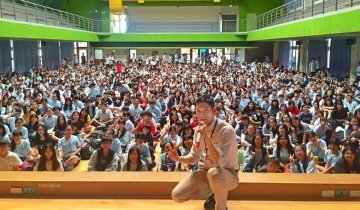Vincent Vigil ME ’04, EdD ’05 says that his path as a leader in student affairs was shaped by six visible and invisible identities.
“Being a gay Latino male, raised in a single-parent household of low socioeconomic status, and being a first-generation college student have all shaped who I am today, and I am proud of all of them,” said Vincent Vigil, while at his desk in the USC LGBT Resource Center. “And many of our students come with pride about the different identities that they have.”
As an only child growing up in Pico Rivera, Vigil was left to care for himself for days at a time in his mother’s absence. Instead of leading him astray, this early independence allowed him to devote himself to work and school in an effort to harness education as “the way out of difficult circumstances.” By junior high, he had developed a dogged focus on getting into college and was filling up his resume with extracurricular activities and student leadership roles. When he became the first in his family to attend college, Vigil asked himself, “Why not go all the way?” He subsequently earned his master’s degree and immediately followed with his doctorate.
Vigil’s work ethic is impossible to dispute. But his success has also been driven by his desire to empower LGBT students and enlighten their peers about the rainbow of diversity on college campuses. That mission took form in 1999, while he was an undergraduate at Whittier College and found few outlets for LGBT students like him. In response, Vigil founded the college’s BGLAD (Bisexual, Gay, Lesbian, and Allies for Diversity) student organization, which is still flourishing today.
Vigil said he had planned to pursue business, but became disillusioned after interning at a marketing company. “I realized that business is very cutthroat, and business does not care about your diverse identities, and does not want to have dialogue and discussion about that, so I knew it wasn’t really the place for me,” Vigil remembered. “I knew that I wanted to make a difference in someone’s life, make an impact.”
Vigil called upon his mentor, Tracy Poon Tambascia, a current professor at USC Rossier who directed the cultural center at Whittier College at the time. She immediately recommended the Postsecondary Administration and Student Affairs (PASA) program at USC.
“Well before I was a faculty member at USC, I was always impressed by the PASA graduates I met,” said Tambascia, who is now coordinator for the PASA program at Rossier. “I knew that the program’s engaged faculty, commitment to urban issues and diversity, and opportunity for great mentorship would help Vincent be successful.”
With financial support from the Lionel De Silva Scholarship, Vigil enrolled at USC Rossier, and jumped right into student activities. However, he once again discovered a lack of cohesion among the LGBT student community. “The students didn’t feel supported or safe, there was a lack of mentorship of LGBT student leaders, and student organizations were dying from one year to the next,” he recalled. “At the time, the students here were trying to do everything themselves, providing support in confidential settings, putting on events, political advocacy, and I saw our center being a home for all of these.”
Vigil didn’t hesitate to take action. He used the research conducted in the PASA program at USC Rossier to convince the university to establish an LGBT resource center in 2005, and he was named its first full-time director, a position he still holds. Today, he uses the assessment tools that he learned in his graduate programs to initiate and improve programs through the center. For example, one year his research revealed a lack of education about LGBT issues in the Greek community, so he created Greek Chat, a confidential discussion forum for fraternity and sorority members.
The master’s program gave me the foundation in terms of creating a campus climate that’s inclusive for all students...The EdD program helped me to think about assessment of programs and services in order to be accountable to the university and the students.
—Vincent Vigil
“The master’s program gave me the foundation in terms of creating a campus climate that’s inclusive for all students, and thinking about how we utilize student development theory in our work in student affairs,” he said. “The EdD program helped me to think about assessment of programs and services in order to be accountable to my stakeholders, the university and the students.” He added, chuckling, “Now, I am kind of an assessment nerd.”
His work to continuously improve resources for LGBT students has not gone unnoticed. In 2013, USC was listed among the “Top 25 LGBT-Friendly Colleges Universities” by Campus Pride and The Huffington Post.
Today, Vigil also serves as an adjunct faculty member for the USC Rossier master’s and EdD programs, and mentors future student affairs professionals as they imagine developing their own programs. His dissertation on the experiences of gay African American males on college campuses illuminated the complex nature of intersecting identities, as he found that his subjects experienced discrimination from the African American community in terms of homophobia and from the LGBT community in terms of racism. “It opened my eyes to the importance of intersectionality education. All of us come with these different visible and invisible identities. We have to educate our students about these issues.”
He said he sees diversity changing the face of higher education in a number of promising ways. “I think our society as a whole is moving rapidly in terms of inclusion of gay and lesbian issues, which I am very happy about. That was the primary focus of the center in 2005,” he said. “I see that the next phase moving forward is going to be educating about transgender and gender identity and expression, for our campus and nationally. I also see there’s going to be more consciousness and awareness on campus about intersectionality of identities, as we have a number of these students now.”
In May, Vigil was named number seven by Honor 41, an organization that lists the top 41 role models within the LGBT Latino community. The organization’s name reclaims the number 41, which in Spanish, has historically been used as a derogatory term for homosexuals. Vigil is modest about the honor, laughing that his colleagues have taken to calling him “number seven” now. But he also knows the importance of such recognition for future generations.
“I didn’t see role models who were both Latino and gay, and we want our youth to go forward with whatever dreams they have, knowing someone like them has done that, too,” he mused. “I hope my story can have some impact on another gay Latino kid’s life that doesn’t see anyone like him in his neighborhood.”




